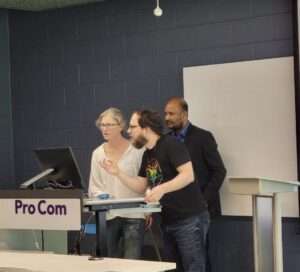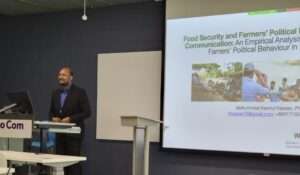Food security, one of the top Sustainable Development Goals (SDGs) has direct relationship with political context as researchers have observed that there has never been a famine in a country that respects democratic rules. This is in line with the idea that civil and political rights help to safeguard economic and social rights, including the right to food. In global south, the marginal farmers are often regarded as the nucleus of rural political, social, and economic activities but often labeled as voiceless in democratic process. They are the most vulnerable in the context of food security.

Their political participation is elaborated as one of the key elements of functioning democracy in many developing countries. Farmers’ political participation is not defined distinctly in the literature except there is contextual variance between farmers and “other citizens” who live in non- pastoral settings. Since farming and related activities shape the basic fabric of rural life, it is often argued that political behavior of farmers is deeply embedded in sustainable agricultural and rural development including food security. For instance, the distribution, price, and availability of agricultural inputs determine the performance of the government to farmers that eventually influence the political decision making. Political efficacy, often viewed as the precondition of political participation, is defined as the feeling that individual political action does have, or can have, an impact upon political process. Therefore, a minimal level of political efficacy and political knowledge of farmers is indispensable for their political participation. Rural communication, in this regard, is often understood as a vital element in shaping farmer’s attitude and behavior on politics and their participation in the political process. Thus, understanding of the farmers’ feeling on how their participation impact political process is important. The more farmers able to understand politics and have their voice heard, the more likely they are to pursue democratic endeavors that would ultimately contribute to policy level change and achieve food security.

Hence, the Green Fund Initiative (GFI) in partnership with Women’s Environment and Development organization conducted a study to investigate the concept of rural communication and its effect on the political efficacy and political participation of farmers in rural Bangladesh. The analysis of the study is based on the survey conducted among the farmers in a sub-district of Bangladesh. The result of the study establishes the theoretical and empirical notion that political interest is a stirring factor positively associates with communication variables. Rural communication shows negative association with political efficacy and reject the idea that consuming more political information can cause higher political efficacy. Political participation and rural communication are significantly correlated. Particularly, communication frequency has showed more significant impact on political engagement than communication source reliability and use. The most important communication component that improve farmers’ political participation come from face-to-face interactions. Key Words: Rural Communication, SDGs, Political Interest, Political Efficacy, Political Participation, Farmers’ Political Participation.

The study was accepted to present in International Communication Association 2023 post conference on “Sustainability and the Local” at Rogers Communication Center, Toronto Metropolitan University, Toronto, Canada on May 30, 2023.
Dr. Mohummad Kamrul Hassan, Cofounder of GFI presented the paper. Mohammad Masud Rayhan, Cofounder of GFI; Shahadat Ali, Director of GFI, and Md Amir Hossain, Coordinator of GFI was present in the conference in Toronto.
GFI Team
For more information: info@greenfundi.org

